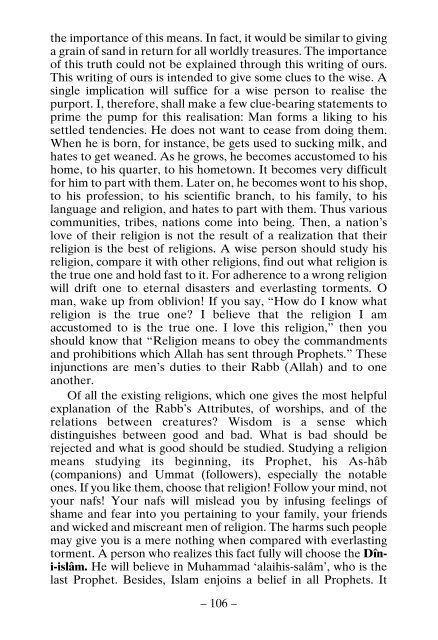Confessions Of A British Spy
Muhammad of Najd was the sort I had been looking for. For his scorn for the time’s scholars, his slighting even the (earliest) four Khalîfas, his having an independent view in understanding the Qur’ân and the Sunna were his most vulnerable points to hunt and obtain him. So different this conceited youngster was from that Ahmed Efendi who had taught me in Istanbul! That scholar, like his predecessors, was reminiscent of a mountain. No power would be able to move him. Whenever he mentioned the name of Abû Hanîfa, he would stand up, go and make an ablution. Whenever he meant to hold the book of Hadîth named he would, again, make an ablution. The Sunnîs trust this book very much. Muhammed of Najd, on the other hand, disdained Abû Hanîfa very much. He would say, “I know better than Abû Hanîfa did. In addition, according to him, half of the book of wrong.
Muhammad of Najd was the sort I had been looking for. For
his scorn for the time’s scholars, his slighting even the (earliest)
four Khalîfas, his having an independent view in understanding
the Qur’ân and the Sunna were his most vulnerable points to hunt
and obtain him. So different this conceited youngster was from
that Ahmed Efendi who had taught me in Istanbul! That scholar,
like his predecessors, was reminiscent of a mountain. No power
would be able to move him. Whenever he mentioned the name of
Abû Hanîfa, he would stand up, go and make an ablution.
Whenever he meant to hold the book of Hadîth named he would, again, make an ablution. The Sunnîs trust this book
very much.
Muhammed of Najd, on the other hand, disdained Abû Hanîfa
very much. He would say, “I know better than Abû Hanîfa did.
In addition, according to him, half of the book of wrong.
Create successful ePaper yourself
Turn your PDF publications into a flip-book with our unique Google optimized e-Paper software.
the importance of this means. In fact, it would be similar to giving<br />
a grain of sand in return for all worldly treasures. The importance<br />
of this truth could not be explained through this writing of ours.<br />
This writing of ours is intended to give some clues to the wise. A<br />
single implication will suffice for a wise person to realise the<br />
purport. I, therefore, shall make a few clue-bearing statements to<br />
prime the pump for this realisation: Man forms a liking to his<br />
settled tendencies. He does not want to cease from doing them.<br />
When he is born, for instance, be gets used to sucking milk, and<br />
hates to get weaned. As he grows, he becomes accustomed to his<br />
home, to his quarter, to his hometown. It becomes very difficult<br />
for him to part with them. Later on, he becomes wont to his shop,<br />
to his profession, to his scientific branch, to his family, to his<br />
language and religion, and hates to part with them. Thus various<br />
communities, tribes, nations come into being. Then, a nation’s<br />
love of their religion is not the result of a realization that their<br />
religion is the best of religions. A wise person should study his<br />
religion, compare it with other religions, find out what religion is<br />
the true one and hold fast to it. For adherence to a wrong religion<br />
will drift one to eternal disasters and everlasting torments. O<br />
man, wake up from oblivion! If you say, “How do I know what<br />
religion is the true one? I believe that the religion I am<br />
accustomed to is the true one. I love this religion,” then you<br />
should know that “Religion means to obey the commandments<br />
and prohibitions which Allah has sent through Prophets.” These<br />
injunctions are men’s duties to their Rabb (Allah) and to one<br />
another.<br />
<strong>Of</strong> all the existing religions, which one gives the most helpful<br />
explanation of the Rabb’s Attributes, of worships, and of the<br />
relations between creatures? Wisdom is a sense which<br />
distinguishes between good and bad. What is bad should be<br />
rejected and what is good should be studied. Studying a religion<br />
means studying its beginning, its Prophet, his As-hâb<br />
(companions) and Ummat (followers), especially the notable<br />
ones. If you like them, choose that religion! Follow your mind, not<br />
your nafs! Your nafs will mislead you by infusing feelings of<br />
shame and fear into you pertaining to your family, your friends<br />
and wicked and miscreant men of religion. The harms such people<br />
may give you is a mere nothing when compared with everlasting<br />
torment. A person who realizes this fact fully will choose the Dîni-islâm.<br />
He will believe in Muhammad ‘alaihis-salâm’, who is the<br />
last Prophet. Besides, Islam enjoins a belief in all Prophets. It<br />
– 106 –


